
Visit Our Sponsors |
|
|
|
|
|
|
|
|
|
|
|
|
|
|
|
|
|
|
|
|
|
|
|
|
|
|
|
|
|
|
|
|
|
|
|
|
|
|
|
|
|
|
|
|
|
|
|
|
|
|
|
|
|
|
|
|
|
|
|

Chicken is already the most popular meat in the U.S., and is projected to be the planet’s favourite flesh by 2020. Future civilisations will find traces of humankind’s 50 billion bird-a-year habit in the fossil record, a marker for what we now call the Anthropocene. And yet responsibility for the dramatic change in our consumption lies not so much in general human activity, but capitalism. Although we’re taught to understand it as an economic system, capitalism doesn’t just organise hierarchies of human work. Capitalism is what happens when power and money combine to turn the natural world into a profit-making machine. Indeed, the way we understand nature owes a great deal to capitalism.
Every civilisation has had some rendering of the difference between “us” and “them”, but only under capitalism is there a boundary between “society” and “nature” — a violent and tightly policed border with deep roots in colonialism.
First taking shape in the era of Christopher Columbus, capitalism created a peculiar binary order. “Nature” became the antonym of “society” in the minds of philosophers, in the policies of European empires, and the calculations of global financial centres. “Nature” was a place of profit, a vast frontier of free gifts waiting to be accepted by conquerors and capitalists.
This was a dangerous view of nature for all sorts of reasons, not least because it simultaneously degraded human and animal life of every kind. What we call “cheap nature” included not only forests and fields and streams, but also the vast majority of humankind. In the centuries between Columbus and the industrial revolution, enslaved and indentured Africans, Asians, indigenous peoples and virtually all women became part of “nature” — and treated cheaply as a result. When humans can be treated with such little care, it’s not surprising that other animals fare even worse under capitalism, especially the ones we end up paying to eat.
RELATED CONTENT
RELATED VIDEOS
Timely, incisive articles delivered directly to your inbox.







